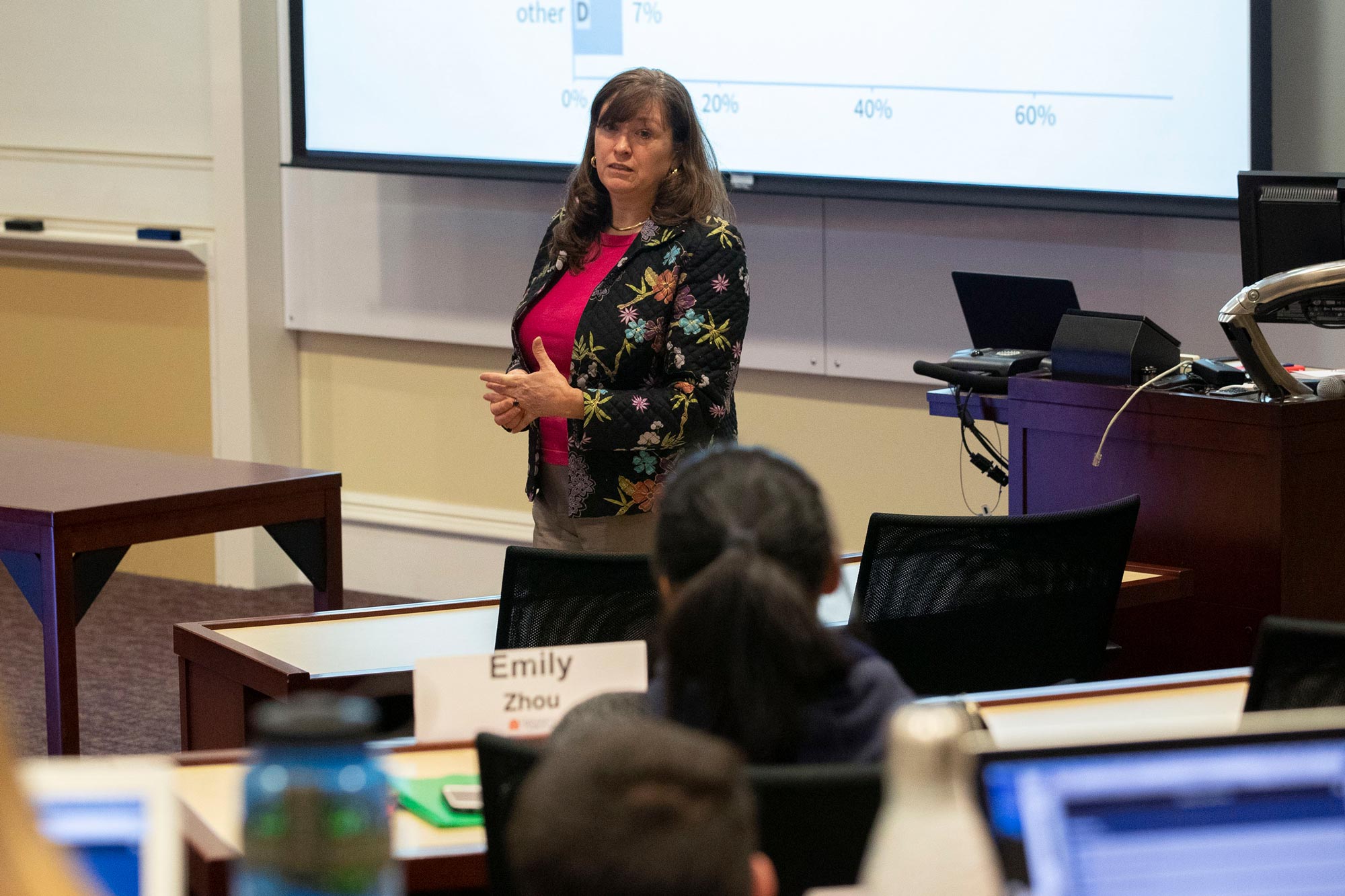Find the latest information on the University’s response to the coronavirus here.
As COVID-19 spreads through the world, disrupting daily life as we knew it, economies are taking a hit and stock market values are falling.
Dorothy Kelly, a chartered financial analyst and personal finance lecturer at the University of Virginia’s McIntire School of Commerce, recommends that people stay calm and focus on protecting their health and finances.
In normal times, Kelly promotes the importance of financial well-being in Comm 2730, McIntire’s personal finance course for non-Commerce students, and in talks to various groups around Grounds. She also directs the CFA Program Partner Initiative at McIntire, assisting students who are interested in pursuing the CFA certification and careers in the investment industry.

Dorothy Kelly, a chartered financial analyst and personal finance lecturer at the McIntire School of Commerce, recommends a calm approach during financial turbulence. (Photo by Dan Addison, University Communications)
Here she offers advice for financial health in this time of turbulence.
Q. How should people respond, right now, to the market downturn?
A. The most important and urgent matter at hand is to stay safe, stay healthy and stay strong. Our overall well-being depends on protecting our physical, emotional, social, spiritual, environmental and financial health, which are all connected. Protecting and maintaining your physical and emotional well-being is the top priority right now.
Some people may worry that the recent stock market decline represents an immediate threat to their financial well-being. My advice to them is simple: Breathe. Don’t panic. Stock market gyrations need not derail your long-term financial well-being, and stressing over them negatively affects your emotional, social and physical well-being.
Unless you are a trader or professional investor, investments held in the stock market should be for intermediate- to long-term goals – goals that are five or more years away. The longer your time frame, the higher the probability of positive stock-market returns. Conversely, the shorter your time frame, the higher the likelihood of negative stock-market returns, which is why funds for short-term goals – money needed within the next 12 months – should be invested in safe, liquid investments such as savings accounts, certificates of deposit or possibly money-market accounts.
The current situation is a strong reminder why everyone needs an emergency fund of at least three and as many as 30 months of living expenses held in safe, liquid investments.
Q. How will this affect retirement plans, and planning?
A. For many people, the value of their 401(k) or defined-contribution retirement plans reached new highs in mid-February, which seems like a very, very long time ago. In the following four weeks, the S&P 500 index, the benchmark for the U.S. stock market, has declined approximately 30%. Such a significant and rapid decline is unsettling, but rapid and significant declines have happened before and will happen again. Younger investors have been surprised to learn that the 12.93% decline in the Dow Jones Industrial Average on March 16 isn’t even close to the record for a bad day, which was set on Oct. 19, 1987, known as Black Monday, when the DJIA declined a whopping 22.6%.
Retirement plans are long-term investments, and short-term volatility is expected in the equity markets. That said, as prices have dropped in recent weeks, volatility has surged. In March, the S&P 500 index had seven consecutive trading days in which the index moved up or down at least 2%. Meanwhile, the Chicago Board Options Exchange Volatility Index, or VIX, has soared from less than 15 in mid-February to more than 80 four weeks later. Investors often call the VIX the “fear index” and use it to measure the level of risk or fear in the market. At current levels, the VIX is flashing bright red; investors are extremely fearful.
For investors making periodic investments, such as payroll deductions to a retirement plan, the recent decline in stock prices has a silver lining. When you make periodic investments through payroll deduction or other means, sometimes you buy high and sometimes you buy low. When prices are low, the same dollar contribution buys more shares. The good news for investors contributing to retirement plans is that this month’s contribution will buy more shares than last month’s contribution.
Q. What if an individual investor feels panic anyway?
A. If declines of 20% or more make you panicky and itching to sell, you have a number of options. One option is to maintain a diversified portfolio that includes cash, bonds and other assets to limit the downside risk. The price for reduced risk is a reduction in potential reward; holding too much in lower-risk assets will reduce the expected returns and potential future value of a portfolio. To stay on track, investors with diversified portfolios should periodically, and at least annually, check the portfolio’s asset allocation to be sure that the investment mix will provide the returns they need within a risk level they are willing and able to tolerate.
After stock prices climbed double digits in 2019, many portfolios were over-weighted in equities and required rebalancing. Make it a habit to review and rebalance your portfolio at least once a year. If you invest in target-date mutual funds, you can sit back and relax – the rebalancing is done for you.
Another recommendation is to avoid checking your balances too frequently, particularly if it causes stress or prompts you to deviate from your established financial plan. You could also adopt a mantra or enlist a financial buddy to help you stay calm and avoid panicking.
According to Benjamin Franklin, an investment in knowledge pays the best dividends. Educating yourself about investments and understanding the risks and rewards of long-term investing could help reduce short-term fear and stress and help you achieve and enjoy financial well-being. For those who are interested, the internet and financial services firms offer countless financial and educational tools to help identify risk tolerance, build and/or evaluate a portfolio for risk and return expectations, and develop a suitable financial plan.
Most importantly, focus on your long-term financial goals. In the short-term, the stock market goes up and it goes down; over the long term, the trend slopes upward. Do not panic.
Q. What are you doing as you see your stock accounts evaporating?
A. Personally, I am watching the news and the market and waiting for opportunities to buy at bargain prices.
Legendary investor Warren Buffett famously recommended, “Be fearful when others are greedy, and greedy when others are fearful.” With the Volatility Index over 70, it is clear that others are fearful. Being greedy as an investor means buying aggressively when others have given up on the market and are selling out of despair or desperation.
When prices drop significantly, investors who use leverage, or borrowed funds, to buy stocks on margin will receive margin calls for more funds. If they don’t have sufficient cash to meet the margin call, they are forced to sell some of their holdings. These forced sales add to the selling pressure and push prices down further. The downward spiral can continue for a while. With forced selling, stock prices can fall significantly below what the shares may be worth going forward.
I don’t like to see people panic, but if they do, I will try to use the opportunity to buy some high-quality stocks at bargain prices to hold for the long term.
I’m nerdy and enjoy looking for investment opportunities. For most people, watching the markets is not fun; they should ignore the markets and focus on staying safe and healthy. They should continue to contribute to their retirement plans, build and maintain an appropriate emergency fund, and check that their asset allocation is appropriate for their financial objective, risk tolerance and time horizon.
Q. Will a stimulus package help the economy while a pandemic is shutting down business activity?
A. A stimulus package is a common fiscal tool to encourage spending or investment to revive a sluggish economy during normal times. We are not in normal times. The immediate problem we all face right now is a global pandemic that threatens our health and safety. The solution for that problem – social distancing – is causing a secondary problem, an abrupt and deep disruption to economic activity. The global economy has slowed precipitously because most everyone is staying home and practicing social distancing to combat COVID-19. No amount of stimulus will boost economic activity while we are sheltering in place.
That said, workers and businesses are suffering from the slowdown, and governments as well as central banks around the globe are rightfully looking for ways to protect and support their citizens and economies.
I would refrain from calling the current U.S. legislative package a stimulus package; it will not stimulate the economy as people shelter in place to limit the spread of COVID-19. The current proposal is a relief package. The proposed checks for taxpayers will provide temporary relief to those whose work and/or paychecks have all but disappeared as people shelter in place.
When the pandemic has been contained, we may see proposals for additional legislation to help get business and the economy back on track.
The pandemic will take a heavy toll as it rolls through our country and our economy, and it will take time to recover. At this point, we don’t know how bad it will be, and it will most likely get worse before it gets better.
Q. If the government sends us each a check, what should we do with it?
A. Personal finance is personal, so what you should do with any funds you receive depends on your personal situation and your financial goals. If you need the money to keep a roof over your head and food on the table or maintain health insurance, that’s how you should use it. If you have enough cash flow to meet your basic needs such as housing, food and insurance, but don’t have an emergency fund, now is the time to start one. If you have an appropriate emergency fund, and a long-term time horizon, you might look for some bargains in the stock market.
You could also use some of the funds to help others who are suffering through this deadly pandemic. Consider using some portion to support local charities helping other community members in need or local businesses struggling to stay open.
Media Contact
Article Information
March 24, 2020
/content/volatile-stock-market-breathe-dont-panic-mcintire-professor-advises

